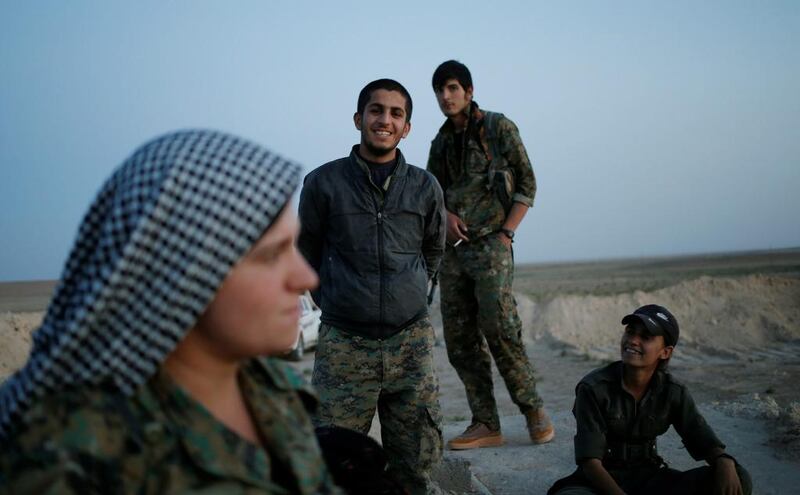By Hassan Hassan and Bassam Barabandi
Amnesty International has in seven months issued two major reports highlighting allegations of war crimes by rebel and Kurdish forces in northern Syria. The two reports are related to a secondary conflict brewing between Arabs and Kurds from Hasakah to Qamashli to Aleppo, which could easily spin out of control and add to the many conflicts that already plague the country.
The United States has an unintentional hand in this new conflict, and de-escalation hinges largely on whether Washington is willing to review its strategy in northern Syria, which sometimes privileges the appearance of success in the battle against ISIL over sustainable policies.
On Friday, Amnesty published a damning new report accusing rebel factions in Aleppo, organised under the Army of Conquest, of committing acts that may amount to war crimes. The rights group said it gathered strong evidence of indiscriminate attacks that killed at least 83 civilians, including 30 children, in the Kurdish-dominated Sheikh Maqsoud between February and April.
On October 13 last year, Amnesty issued a report, Forced Displacement and Demolitions in Northern Syria, accusing the Kurdish political party PYD, the Democratic Union Party, of carrying out a wave of forced displacement and home demolitions that it also said may amount to war crimes. The shelling of civilians by rebel forces cannot be justified, and perpetrators must be punished and restrained by their regional backers. The attacks on Sheikh Maqsoud were encouraged by some supporters of the opposition living abroad, after the PYD’s military wing, the YPG, attacked the rebels in February. Worse, such calls continue to be heard and more indiscriminate attacks can be expected.
Clashes between the rebels and the YPG are not new. Bad blood between the two sides goes back to 2012, when the rebels were attacked by the YPG as they carried out raids against government bases in northeastern Syria. Tensions between the rebels and the YPG destroyed any hope for cooperation between the two sides.
Additionally, Turkey, a key backer of the opposition in the north, vehemently opposes the dominance of the YPG, an offshoot of the terrorist-designated PKK, near its southern border. For Turkey, the YPG’s ambitions in northern Syria are a matter of national security, and Ankara is unlikely to compromise on what it views as a direct threat, even if it often bows to American pressure as the anti-ISIL fight continues.
But it does not have to be an either/or situation. A third track exists: thousands of Syrian Kurdish fighters have been stranded in northern Iraq since 2012, waiting for a green light from the US to be deployed inside Syria to fight alongside the YPG and the opposition. According to several sources, including high-level Kurdish leaders from northern Syria, the 5,000 fighters were funded and trained by Iraq’s Kurdish Regional Government (KRG), when hundreds of Kurdish youngsters started heading to northern Iraq after anti-regime Kurdish activists called on fellow Kurds to defect or refuse to join the army.
“Some of the trained fighters returned to Syria to form cells that would serve as supporting forces to the 5,000 fighters when they are deployed inside Syria,” one prominent Kurdish activist told us. “But there was confrontation with the PYD militias, which dug a trench between [Iraqi] Kurdistan and Malikiyah [in Syria] to prevent our entry.”
The Kurdish source said the two rivals negotiated under the auspices of the KRG president, Massoud Barzani, and they reached two agreements, the Hewler (another name for Erbil) agreement in July 2012 and the Dohuk agreement last October.
“The two agreements stipulate that we form joint political and military forces,” the source said. “When they returned to Syria, they would abandon the agreement. Now they reject our return categorically. We spoke to the Americans last May and they promised to do something.”
The US fears that the return of fighters would create disruptive tensions between the Kurdish sides. Rivalry between the two is already felt inside Syria. A source inside Qamashli spoke of constant intimidation by the YPG against their rivals. Also, recent battles in Aleppo included clashes with fellow Kurds who fight on the rebel side.
The strength of the anti-PYD Kurdish fighters is that their leaders are part of the Kurdish National Council, which is part of the opposition’s National Coalition. Turkey views them as potential allies. The trick is for the US to exert serious effort to bring the two Kurdish rivals closer, which will help build a bridge with the Syrian opposition, and reassure its Nato ally to focus on the ISIL fight. Many of the YPG’s commanders have a clearly expansionist and exclusivist agenda, viewed suspiciously not only by Turkey and the Syrian opposition but by the Kurdish leadership in Iraq.
The US may not want to jeopardise its relationship with a force that has helped it win key tactical battles against ISIL in Syria. But the unconditional support for the YPG is irresponsible because it creates unnecessary conflicts and undermines the long-term war against extremists.
Hassan Hassan is a resident fellow at the Tahrir Institute for Middle East Policy. Bassam Barabandi is a former Syrian diplomat and co-founder of People Demand Change





